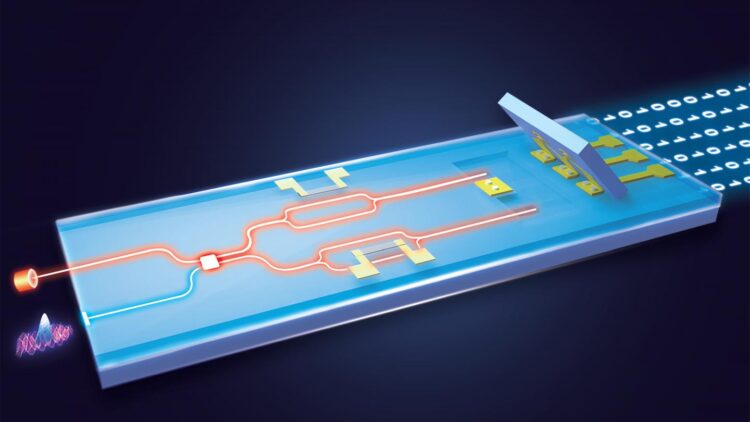At roughly the size of a fingertip, the integrated photonics chip delivers random number output more than twice as fast as conventional QRNGs.
WASHINGTON, June 29, 2021 — As pervasive as they are in everyday uses, like encryption and security, randomly generated digital numbers are seldom truly random.
So far, only bulky, relatively slow quantum random number generators (QRNGs) can achieve levels of randomness on par with the basic laws of quantum physics, but researchers are looking to make these devices faster and more portable.
In Applied Physics Letters, by AIP Publishing, scientists from China present the fastest real-time QRNG to date to make the devices quicker and more portable. The device combines a state-of-the-art photonic integrated chip with optimized real-time postprocessing for extracting randomness from quantum entropy source of vacuum states.
“Recently, the technology of integrated quantum photonics has exhibited significant advantages in terms of size reduction,” said author Jun Zhang. “In this work, we further prove that such technology could be used for ultrafast, real-time quantum random number generation.”
Most QRNGs today use discrete photonic and electronic components, but integrating such components within a chip remains a technical challenge.
“Quantum random numbers are unpredictable, irreproducible and unbiased, whose randomness comes from the intrinsic indeterministic nature of quantum physics,” Zhang said.
The group’s chip uses indium-germanium-arsenide photodiodes and a transimpedance amplifier integrated onto a silicon photonics chip that includes several couplers and attenuators. Combining these components allows the QRNG to detect signals from a quantum entropy source with significantly improved frequency response.
“The surprising point in our work is that the high-frequency response performance of the final photonic integrated chip is better than expected,” Zhang said.
To boot, the group’s chip measures only 15.6 by 18.0 millimeters, significantly smaller than most of current QNRG modules or instruments.
Zhang and the group hope their approach helps pave the way for QRNGs to become a more practical solution for fast and compact devices.
“Based on our present work, in the future, we will develop a low-cost single chip of QRNG with moderate random bit rate, at the level of megabits per second, for commercial uses,” Zhang said. “Such a single chip could be very useful in diverse electronic systems requiring random numbers or signals and even in mobile phones to improve the security.”
###
The article, “18.8 Gbps real-time quantum random number generator with a photonic integrated chip,” is authored by Bing Bai, Jianyao Huang, Guan-Ru Qiao, You-Qi Nie, Weijie Tang, Tao Chu, Jian-Wei Pan, and Jun Zhang. The article will appear in Applied Physics Letters on June 29, 2021 (DOI: 10.1063/5.0056027). After that date, it can be accessed at https:/
Media Contact
Larry Frum
[email protected]
Related Journal Article
http://dx.





